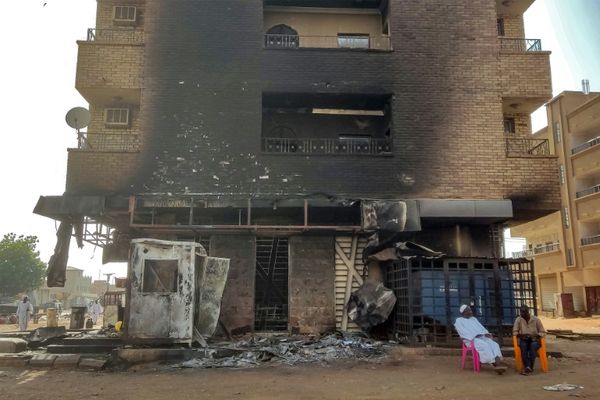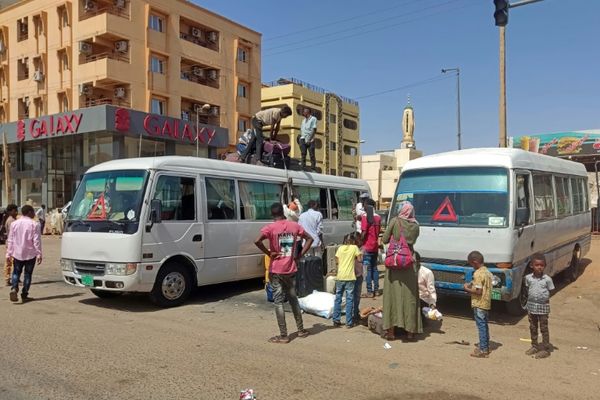
Khartoum (AFP) - Fighting eased in Sudan on Wednesday, the second full day of a ceasefire that has allowed beleaguered civilians to venture out, even as they await safe aid corridors and escape routes.
Sporadic air strikes and artillery fire still boomed across the capital, residents told AFP, but US and Saudi observers said "fighting in Khartoum appeared to be less intense" since the one-week humanitarian pause entered into force late Monday.
Washington and Riyadh, which brokered the ceasefire between the forces of two rival generals, however pointed to reports "indicating that both sides violated the agreement".
Nonetheless, they stressed preparations were underway "to deliver lifesaving assistance" to the people of Sudan, who have endured more than five weeks of fighting that has claimed more than 1,800 lives, according to updated figures released Wednesday by the Armed Conflict Location and Event Data Project (ACLED).
Aid agencies had already been ramping up deliveries despite the killing of some of their workers, looting of their facilities, and most hospitals being unable to function in conflict areas.
Humanitarians have sought safe corridors so assistance can reach the 25 million Sudanese -- half the population -- who the UN says need aid.
The war broke out on April 15, sparking frantic mass evacuations of thousands of foreigners and forcing more than 1.3 million people to flee their homes internally and across borders.
The chaos has left millions hunkering down in their homes to hide from the bullets and roaming looters amid power blackouts and shortages of water, food, medicines and other staples.
Residents in various district of the capital on Wednesday reported columns of black smoke rising as some fighting continued, including in the Jabra neighbourhood of southern Khartoum where gunfire was heard.
"In spite of successive ceasefires, civilians continue to be exposed to serious risk of death and injury," United Nations rights chief Volker Turk said.
The relative calm provided a chance for some to venture out.
Khartoum resident Ali Mohammed said the water supply still had not been restored on Wednesday, "but at least I was able to go out and buy water for my family".
Mohammed Taher, 55, was finally able to "go to Khartoum's central market five kilometres (three miles) away to buy food and return without incident", he said.
'Trajectory of collapse'
The relative calm gave Ihssan Dafaallah the chance to take his mother to a doctor, "because she had gone without medicine for 20 days".
In southern Khartoum, men sat on plastic chairs in front of a burned out bank building.
The fighting pits Sudan's de facto leader, army chief Abdel Fattah al-Burhan, against his former deputy, Mohamed Hamdan Daglo, nicknamed "Hemeti", who commands the paramilitary Rapid Support Forces (RSF).
Numerous ceasefires were previously announced and immediately violated, but the US and Saudi Arabia said this one is different because it is a signed deal supervised by a monitoring committee.
Battles have displaced more than a million people inside Sudan, the International Organization for Migration reported on Wednesday, with a further 319,000 people seeking refuge across borders including to Chad, Egypt and South Sudan.
There are fears the conflict could spread because of transnational ethnic ties.
Fighting has been especially deadly in the Darfur region, where more than 700 fatalities have been reported in the West Darfur state capital El Geneina since the war began, ACLED said.
In the early 2000s Sudan's then strongman Omar al-Bashir unleashed in Darfur the notorious Janjaweed militia in response to an uprising against the power and wealth of Sudan's Arab elites.
An estimated 300,000 people may have died and more than 2.7 million were displaced at the peak of the years-long conflict, from which Darfur has never fully recovered.
The RSF are descendants of the Janjaweed.
'Somali scenario'
Sudan expert Alex de Waal warned the "trajectory of state collapse" is now threatening "to turn Sudan as a whole, including Khartoum, into something that resembles the Darfur of 10 to 15 years ago".
He pointed to Daglo's roots in the Janjaweed and said this "is the environment within which Hemeti thrived, where money and guns determine everything -– this is the future of Sudan if this carries on".
Jean-Nicolas Armstrong Dangelser of aid group Doctors Without Borders (MSF) said that, after the looting of an MSF medical warehouse in Khartoum, "fridges were unplugged and medicines removed", meaning "the medicines are spoiled and can't be used to treat anyone".
The violation of humanitarian principles and space for aid workers to operate "is shrinking on a scale I've rarely seen before", he said.
Yasser Abdelaziz, a civil servant in the northern town of Shendi, said he fears the war could lead to turmoil seen elsewhere in the Horn of Africa.
"I'm afraid that the scenario to come will not be Syria, Libya or Yemen," he said, "but the Somali scenario, with people driven by racism and tribalism".










